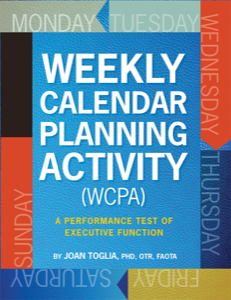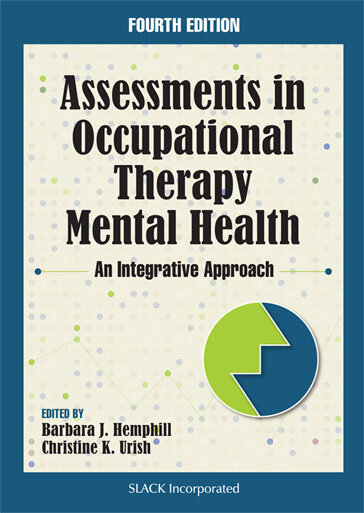Easily portable
Objective scores
Normative data
Alternate forms for retesting
Directly relevant to treatment planning
particularly for Metacognitive Strategy Interventions such as the Multicontext Approach
Research & Publications on the WCPA
Examples of Other Publications / Studies that Include the WCPA
Al-Heizan, M. O., Marks, T. S., Giles, G. M., & Edwards, D. F. (2022). Further validation of the menu task: functional cognition screening for older adults. OTJR: Occupation, Participation and Health, 42(4), 286-294.
Fisher, O., Berger, I., Grossman, E. S., Tal-Saban, M., & Maeir, A. (2022). Weekly Calendar Planning Activity (WCPA): Validating a Measure of Functional Cognition for Adolescents with Attention Deficit Hyperactivity Disorder. The American Journal of Occupational Therapy, 76(6).
Fisher, O., Berger, I., Grossman, E. S., & Maeir, A. (2022). Online and intellectual awareness of executive functioning in daily life among adolescents with and without ADHD. Journal of Attention Disorders, 26(6), 870-880. 10870547211031982.
Holmqvist, K. L., Holmefur, M., & Arvidsson, P. (2020). Test–retest reliability of the Swedish version of the Weekly Calendar Planning Activity–a performance-based test of executive functioning. Disability and rehabilitation, 42(18), 2647-2652.
Gong, C., Wang, R., & Wang, N. (2025). Validity of the Chinese version of the weekly calendar planning activity (WCPA) on assessing executive function in adults with stroke. Neuropsychological Rehabilitation, 35(2), 362-381.
Jaywant, A., Steinberg, C., Lee, A., & Toglia, J. (2022). Feasibility and acceptability of the multicontext approach for individuals with acquired brain injury in acute inpatient rehabilitation: A single case series. Neuropsychological Rehabilitation, 32(2), 211-230.
Kaizerman-Dinerman, A., Roe, D., Demeter, N., & Josman, N. (2023). Do symptoms moderate the association between participation and executive functions outcomes among people with schizophrenia?. BMC psychiatry, 23(1), 1-10.
Kaizerman-Dinerman, A., Roe, D., & Josman, N. (2018). An efficacy study of a metacognitive group intervention for people with schizophrenia. Psychiatry Research, 270, 1150-1156.
Lahav, O., & Katz, N. (2015). Weekly calendar planning activity for university students: Comparison of individuals with and without ADHD by gender. Journal of Attention Disorders, 19, 1-11.
Lahav, O., & Katz, N. (2020). Independent older adult’s IADL and executive function according to cognitive performance. OTJR: Occupation, Participation and Health, 40(3), 183-189.
Lussier, A., Doherty, M., & Toglia, J. (2019). Weekly calendar planning activity. In T. J. Wolf, D. F. Edwards & G. M. Giles (Eds.), Functional cognition and occupational therapy: A practical approach to treating individuals with cognitive loss (1st ed., pp. 75-89). Bethesda, MD: American Occupational Therapy Association, Inc.
Marks, T. S., Giles, G. M., Al-Heizan, M. O., & Edwards, D. F. (2021). Screening to Assessment Pathways in Evaluating Functional Cognition in Older Adults. OTJR: Occupation, Participation and Health, 15394492211021851.
Marks, T. S., Giles, G. M., & Edwards, D. F. (2024). Online awareness is associated with superior performance on assessments of functional cognition. Frontiers in Aging Neuroscience, 16, 1384812.
Marks, T. S., Giles, G. M., & Edwards, D. F. (2025). Functional cognitive performance augments cognitive screening data in older adults. Frontiers in Aging Neuroscience, 17, 1535146.
Matsubara A, Higashi Y, Kawabata M, Sugihara K. (2025). Validity of the Japanese Version of the Weekly Calendar Planning Activity (WCPA)-10 on Assessing Executive Function in Patients with Acquired Brain Injury (ABI). Brain Sciences. 15(9):993. https://doi.org/10.3390/brainsci15090993
Memmer, S., & Pollard, M. (2020). Comparison of Executive Function Skills of Health Professional Undergraduate and Graduate Students. International Journal of Health Sciences, 8(1), 7-16.
Salazar-Frías, D., Funes, M. J., Merchán-Baeza, J. A., Ricchetti, G., Torralba-Muñoz, J. M., & Rodríguez-Bailón, M. (2023). Translation, cross-cultural adaptation and validation of the 10-item Weekly Calendar Planning Activity in Spanish-speaking ABI patients: a multicenter study. Frontiers in Psychology, 14, 1018055.
Salazar-Frías, D., Funes, M. J., Szot, A. C., Laffarga, L., Navarro-Egido, A., & Rodríguez-Bailón, M. (2025). The Moderating Role of Online Awareness in the Association between Strategy Use and Performance Accuracy on a Test of Functional Cognition in Individuals with Acquired Brain Injury. Archives of Clinical Neuropsychology, 40(4), 842-857.
Schejter‐Margalit, T., Binyamin, N. B., Thaler, A., Maidan, I., Cedarbaum, J. M., Orr‐Urtreger, A., ... & Kizony, R. (2024). Validity of the Short Weekly Calendar Planning Activity in patients with Parkinson disease and nonmanifesting LRRK2 and GBA carriers. European Journal of Neurology, e16327.
Sullivan, A. C., Vas, A. K., & Johnson, W. L. (2024). Transition to Adulthood: Executive Functions and Independent Living Skills in Autistic Young Adults. Occupational Therapy In Health Care, 1-22.
Sullivan, A.C., Vas, A.K., Tierney, S., & Toglia, J. (2026). Assessing Functional Cognition in Autistic Adults: The Weekly Calendar Planning Activity. American Journal of Occupational Therapy. 80, 8002205100. https://doi.org/10.5014/ajot.2026.051340.
Tamm, L., Hamik, E., Yeung, T. S., Zoromski, A. K., Mara, C. A., & Duncan, A. (2024). Achieving Independence and Mastery in School: A School-Based Executive Function Group Intervention for Autistic Middle Schoolers. Journal of Autism and Developmental Disorders, 54(12), 4357–4368. https://doi.org/10.1007/s10803-023-06164-7
Toglia, J., & Berg, C. (2013). Performance-based measure of executive function: Comparison of community and at-risk youth American Journal of Occupational Therapy, 67(5), 515-523.
Weiner, N. W., Toglia, J., & Berg, C. (2012). Weekly Calendar Planning Activity (WCPA): A performance-based assessment of executive function piloted with at-risk adolescents. American Journal of Occupational Therapy, 66(6), 699-708.
Wingren, M., Lidström-Holmqvist, K., Roshanai, A. H., Arvidsson, P., Janeslätt, G., White, S., & Holmefur, M. (2022). One-year follow-up after the time management group intervention Let’s Get Organized. Scandinavian Journal of Occupational Therapy, 29(4), 305-314.
Zlotnik, S., Tal – Saban, M., fisher and Doherty, M. (2021) Adaptation and Cross-cultural Comparison of The Weekly Calendar Planning Activity (WCPA) – Middle/High School version. Israeli Journal of Occupational Therapy, (p. E6-E24.) [In English].
Zlotnik, S., & Toglia, J. (2018). Measuring Adolescent Self-Awareness and Accuracy Using a Performance Based Assessment and Parental report. Frontiers in Public Health, 6(15), 1-9. (includes norms for adolescents)
Zlotnik, S., Regev, S., & Weiss, P. L. (2025). Metacognitive Intervention Facilitating a Growth Mindset for Youth at Risk: The Contribution of Occupational Therapy Practitioners to the Educational Team. The American Journal of Occupational Therapy, 79(1).
Zlotnik, S., Schiff, A., Ravid, S., Shahar, E., & Toglia J. (2020). A new approach for assessing executive functions in everyday life, among adolescents with Genetic Generalized Epilepsies (GGE's). Neuropsychological Rehabilitation, 30:2, 333-345, DOI: 10.1080/09602011.2018.1468272.
Toglia, J. & White, S. The Weekly Calendar Planning Activity. (2020). In B. J. Hemphill and C. K. Urish (Eds.) Assessments in Occupational Therapy Mental Health: An Integrative Approach (4th Ed.). (pp. 239-259). Slack Inc: Thorofare, NJ.







